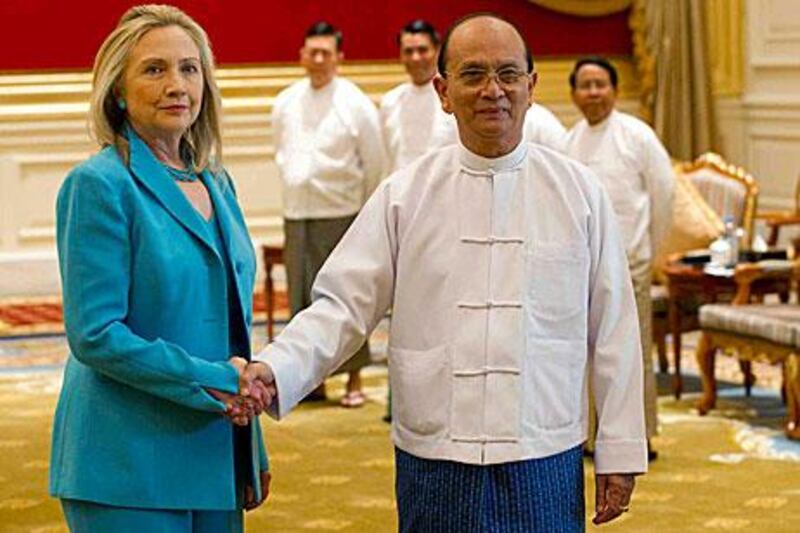BEIJING // The US yesterday indicated it was willing to strengthen ties with Myanmar after a year of political reform - but said it could not lift sanctions unless the isolated, military-backed government continued to make progress.
The US secretary of state, Hillary Clinton, held talks in Myanmar yesterday with the country's president, Thein Sein.
She said afterwards that Washington was "prepared to respond to reforms with measured steps to lessen its isolation and improve the lives of citizens".
"The president told me he hopes to build on these steps and I assured him that these reforms have our support," Mrs Clinton added. "I also made clear that, while the measures already taken may be unprecedented and welcomed, they are just the beginning."
After "candid, productive" discussions, Mrs Clinton announced that the US would consider upgrading diplomatic ties to ambassador level and would ease restrictions on aid efforts by international organisations, including the UN.
She said the lifting of sanctions, imposed after a crackdown on democracy campaigners two decades ago, was not possible without reforms, such as the release of more political prisoners - aid groups say 1,600 remain behind bars - and the end of military conflicts with ethnic minorities, amid allegations from rights groups of atrocities.
Also key, Mrs Clinton said, was that nuclear watchdogs be allowed free access, following allegations that Myanmar had forged ties with North Korea to secure nuclear technology in defiance of sanctions.
Observers said the success or failure of Mrs Clinton's visit - she is the first US secretary of state to travel to Myanmar for more than five decades - would be determined by what action the authorities there take after the trip.
Over the past year, a civilian government - albeit one backed by the military - has been installed and some political prisoners have been released.
The democracy campaigner and Nobel Peace Prize winner, Aung San Suu Kyi, has also had her house arrest lifted.
US officials said Mr Thein yesterday indicated his country was looking to release more dissidents and would uphold UN Security Council resolutions concerning nuclear technology.
But analysts have voiced concerns that the Myanmar government's primary aim in carrying out limited reforms has been to improve the country's economic standing and to strengthen ties with the West as a counterbalance to Chinese influence, rather than from a genuine commitment to liberalisation.
The Myanmar authorities' willingness to develop diplomatic links that could stem Chinese influence coincides with Washington's desire to act as a bulwark in the Asia-Pacific region to an increasingly assertive Beijing. Further reform in Myanmar will depend upon the nominally civilian government being able to retain the backing of the military by reassuring them that their "power and privileges are secure", said Chung Chien Peng, an associate professor of political science at Lingnan University in Hong Kong.
There could be backpeddling on reforms, he added, if the military "feels the opening up is getting out of control".
"The military is more pro-Chinese, so the civilian [government] could be trying to reorientate the foreign policy," he said.
Mrs Clinton's meeting yesterday was held in what was described as a grandiose palace in the new capital, Naypyidaw.
Other initiatives discussed included efforts to recover the remains of Americans who died in the country during the Second World War.
Also, Myanmar was invited to become an observer to the Lower Mekong Initiative, a programme sponsored by the US that involves several south-east Asian countries.
Mrs Clinton, who flew to Myanmar on Tuesday, travelled yesterday to Yangon for a dinner with Ms Suu Kyi, ahead of formal talks today.
Ms Suu Kyi, who heads the National League for Democracy, has supported the US decision to send its most senior diplomat to Myanmar but has been cautious over the lifting of sanctions without further reforms.






